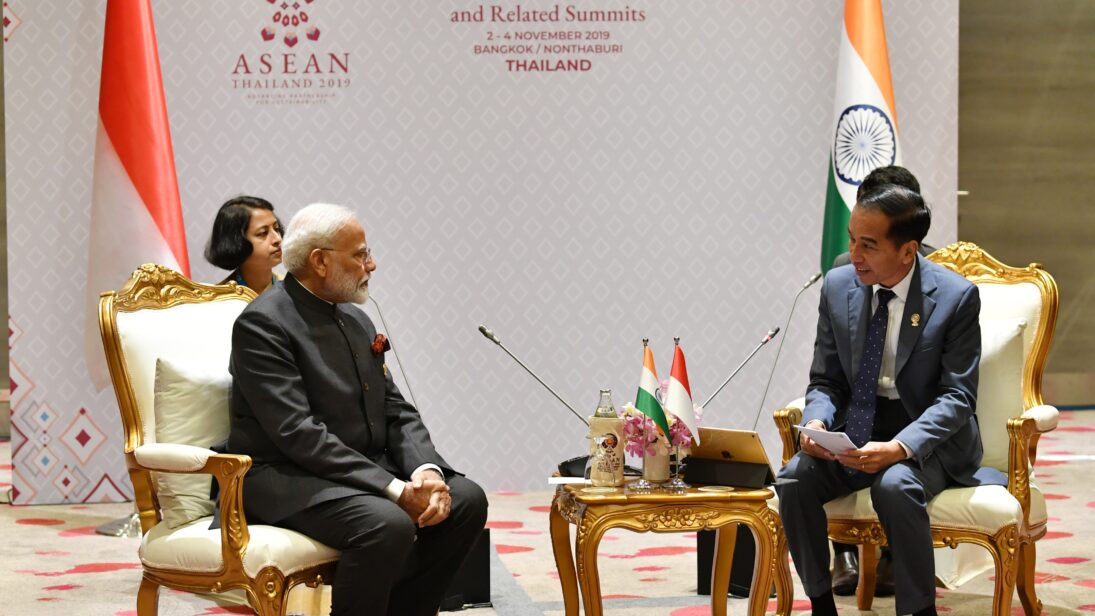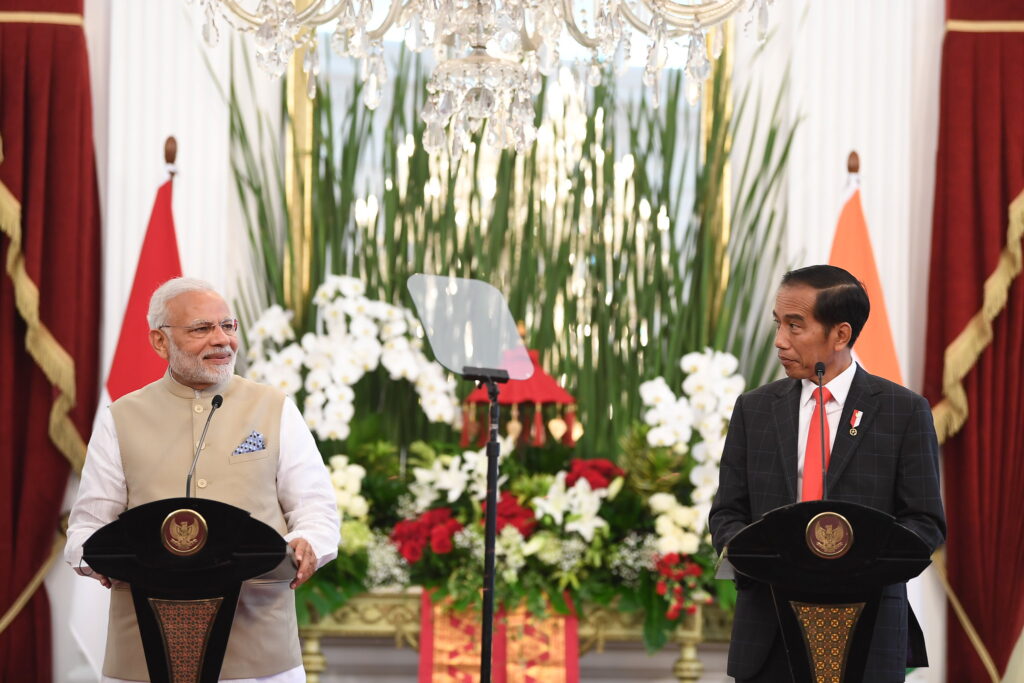
In February 2021, Myanmar witnessed a coup that overthrew the democratic government and installed a military rule in its stead. While, domestically, it displaced over 638,000 people, and exacerbated the existing drug and human trafficking problems in the country, the repercussions of the coup were felt beyond its borders, especially in India and Indonesia. In India, the aftershocks of the coup were evident at the northeastern border with Myanmar, which witnessed an influx of refugees attempting to cross into India. Similarly, Indonesia faces the challenge of accommodating incoming refugees in its sensitive Aceh province.
While ongoing instability in Myanmar poses a challenge for both countries, it also provides an avenue for potential cooperation between policymakers in New Delhi and Jakarta. The conflict presents shared challenges for India and Indonesia, such as accommodating refugees, preventing humanitarian catastrophe, promoting peace talks between the Tatmadaw and the National Unity government, and addressing the international isolation of Myanmar’s Army, which is increasingly dependent on China. Therefore, cooperation between New Delhi and Jakarta will help expand India-Indonesia bilateral engagement beyond its present focus on maritime cooperation, while both states work towards improving the conditions in Myanmar.
The Case for Deepening India-Indonesia Collaboration
Due to Myanmar’s strategic location, violent turmoil in the country could destabilize both South and Southeast Asia. Therefore, regional powers like India and Indonesia must help stabilize Myanmar, addressing the refugee crisis, providing health and humanitarian aid, and jointly persuading Western countries to consult with the regional powers before imposing any sanctions. This would also help India and Indonesia grow their influence in the region and build deeper ties with each other.
India and Indonesia must help stabilize Myanmar, addressing the refugee crisis, providing health and humanitarian aid, and jointly persuading Western countries to consult with the regional powers before imposing any sanctions.
Myanmar maintains a 1,640-kilometer land border with four Indian states that have been afflicted by insurgency—Manipur, Mizoram, Nagaland, and Arunachal Pradesh. Combating cross-border insurgencies is a critical aspect of bilateral cooperation between India and Myanmar. It is imperative for India to explore other mechanisms, including the bilateral relationship with Indonesia, in order to foster regional peace and not rely entirely on ASEAN initiatives.
Partnering with Indonesia allows India to address its domestic security concerns by addressing external instability. For Indonesia, a partnership with India, a larger democratic country with extensive experience in assisting states in the development of their institutions, would allow Indonesia to support Myanmar and other ASEAN nations more effectively.
As a result, it is in India’s long-term interests to include Indonesia in other areas of cooperation, such as the BRICS Summits (a multilateral group of five emerging economies: Brazil, Russia, India, China, and South Africa) and the IBSA Dialogue Forum (which includes India, Brazil, and South Africa), the International Solar Alliance, and other political and economic initiatives. As a rising democratic country with diplomatic and economic clout, Indonesia would be a valuable partner in maintaining democracy in the Indo-Pacific, given the country’s voiced support for democracy and human rights, which includes the incorporation of democracy and human rights in the ASEAN Political-Security Community, the ASEAN Charter, and its push for the establishment of the ASEAN Intergovernmental Commission on Human Rights (AICHR), and the establishment of the Bali Democracy Forum.
In the past, Indonesia has consistently backed Myanmar’s democratic government and played a key role in reaching the ASEAN five-point consensus. Indonesian President Joko Widodo was also a driving force behind ASEAN’s historic decision to prevent Myanmar’s junta leader from attending the bloc’s October summit. India has tried to engage with the junta in Myanmar while continuing to “push for democracy” in the region.
These efforts could be supplemented by the formation of a 2+2 dialogue which will allow India and Indonesia to discuss their respective strategic and security objectives and would synchronize their respective policy positions vis-à-vis Myanmar. It could also serve as a starting point for future engagement. Indonesia already has 2+2 agreements in place with Japan and Australia, leaving India as the only Quad country in Asia that has yet to adopt the framework with leaders in Jakarta.

To further strengthen regional collaboration and peace-making, India should also incorporate Indonesia in its BIMSTEC framework, as Indonesia is a master architect of regional cooperation as has played an active role in resolving intra-ASEAN disputes. As Indonesia assumes the G20 presidency, coordinating with Jakarta could prove to be a smart strategic decision for India.
In wake of the rise of religious extremism in both countries, it is critical that both work together to overcome the unanticipated issues that may arise and potentially weaken the India-Indonesia partnership. The religious diversity of both nations provides an additional avenue for cooperation in the form of a renewal of the Interfaith Dialogue and consultation, the first of which was held in 2018 with officials of the Indian and Indonesian governments.
Challenges to Cooperation
While this prospective route of cooperation could improve engagement and help stabilize Myanmar, there are also obstacles to cooperation for the two nations. These difficulties stem from internal and external influences, including each country’s domestic perception towards accommodating refugees and China’s influence.
In wake of the rise of religious extremism in both countries, it is critical that both work together to overcome the unanticipated issues that may arise and potentially weaken the India-Indonesia partnership
For India and Indonesia, China’s influence presents a pervasive external challenge. For decades India has experienced a contentious relationship with China with issues ranging from tensions surrounding ongoing border disputes to China’s increasing influence in India’s neighboring countries. Therefore, any move by India to expand its influence in Myanmar via an increased cooperation with Indonesia has the potential to exacerbate friction with China. This concern is also similar for Indonesia who experiences a fragile relationship with China due to ongoing Chinese encroachment in the South China Sea.
ASEAN has been unable to reach a consensus on Myanmar’s coup. The more democratic ASEAN members expressed their dissatisfaction, requested the release of political detainees, and eventually demanded that army general Min Aung Hlaing be excluded from attending leaders’ summits. This complicates Indonesia’s position on the Myanmar problem even further. While cooperation with India may appear to be a sensible option, Indonesia may have difficulty balancing these factors with its current partnerships with other Southeast Asian countries.
While these factors might prevent India and Indonesia from fostering a relationship, domestic public opinion has a potential to overcome these obstacles and spur India and Indonesia to action. In considering its response to the crisis in Myanmar, India must consider accommodating refugees fleeing from persecution in Myanmar—many of these refugees share an ethnic heritage with Indian citizens in bordering states. Considering these dynamics, India does not want to contribute to the junta’s woes by providing safe haven for ethnic armed groups in the border region. In Indonesia’s context, the Myanmar issue is particularly difficult to resolve. This was highlighted by instance in June 2020 of the local population in Aceh rescuing and providing shelter to Rohingya refugees, contradicting the Indonesian government’s position.
Conclusion
Myanmar’s military coup and the ensuing refugee crisis has been one of South and Southeast Asia’s most significant geopolitical events in the last year. The coup presents an opportunity for two regional powers, India and Indonesia, to strengthen their bilateral relationship while also dealing with the fallout from lingering instability in Myanmar.
India’s relationship with Indonesia has been primarily motivated by security concerns such as terrorism and maritime security cooperation, with the two countries only recently discussing the possibility of future arms production collaboration. However, because of the presence of extra-regional forces in the region as a result of the formation of the Quad and AUKUS, Indonesia is becoming increasingly concerned about its status as a leader in the Indo-Pacific. Increased engagement with India could help to alleviate those fears. To improve the strategic depth of the relationship, India must expand its engagement with Indonesia beyond maritime projects. In an era when democracies around the world face extraordinary challenges, the collaboration of two of the world’s major democracies on issues in Myanmar has the potential to convey a strong message of solidarity and resilience.
***
Image 1: MEAphotogallery via Flickr
Image 2: MEAphotography via Flickr


